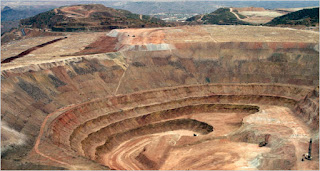The top 0.1% ...
The richest people in the world.
People whose wealth exceeds that of a million average folks. Wealth that for the median income group has no frame of reference for a discussion.
The odd and unasked question ... why are they so rich?
Is it because they work harder?
Is it because they are smarter?
Is it because they deserve it more than anyone else?
Some of them are the hard-working, clever ones like Jobs or Gates. And generous as well, some of them.
Some are brilliant innovators like Oracle's Ellison or Amazon's Bezos.
Or smart investors like Buffet.
Some are celebrities, athletes, and others who get paid extraordinary amounts for the entertainment value of their appearance or physical talent.
 |
| Just in case you were beginning to think rich people were deeply misunderstood and that they feel the pain of those who are less fortunate, here’s the world’s wealthiest woman, mining tycoon Gina Rinehart, with some helpful advice. “If you’re jealous of those with more money, don’t just sit there and complain,” she said in a magazine piece. “Do something to make more money yourself — spend less time drinking or smoking and socializing, and more time working.” Yeah, let them eat cake. Rinehart made her money the old-fashioned way: She inherited it. Her family iron ore prospecting fortune of $30.1 billion makes her the richest woman on the planet. “Become one of those people who work hard, invest and build, and at the same time create employment and opportunities for others.” Right. She makes more in a minute than most folks make in a year. In her defense, she gives away around 1/1,000th of her income to charitable work. |
Then, of course, there's the world's top 20% ...
Interestingly, the gap between the wealthy and the rest is widening faster than ever before.
 The gap between the rich world and the poor world is quite visible, and is now the subject of broadly based discussion. And concern.
The gap between the rich world and the poor world is quite visible, and is now the subject of broadly based discussion. And concern.So what legacy will the wealthy leave to the rest of their relatives? To the rest of humanity?
Around 80% of humanity lives below the western world's poverty line. That's five billion people.
Around 27% of all children in developing countries are estimated to be underweight or stunted. The two regions that account for the bulk of that deficit are South Asia and sub-Saharan Africa. (If you walk the streets there, you'll meet them every day along with their families. By the hundreds in a given hour. Sweet folks, most of them.)

According to UNICEF, 22,000 children die each day due to poverty. And they “die quietly in some of the poorest villages on earth, far removed from the scrutiny and the conscience of the world. Being meek and weak in life makes these dying multitudes even more invisible in death.”Source 4

Nearly a billion people entered the 21st century unable to read a book or sign their names.Source 7
In
developing countries some 2.5 billion people are forced to rely on firewood,
charcoal and animal dung for cooking. In
sub-Saharan Africa, over 80 percent of the population depends on traditional
biomass for cooking, as do over half of the populations of India and China.Source 14
Less than one per cent of what the world spent every year on weapons was needed to put every child into school by the year 2000, and of course, it didn’t happen.Source 8
Oh, and why are the poor ... well, poor?
"There are 47 percent of the people ... who are dependent upon government, who believe that they are victims, who believe the government has a responsibility to care for them, who believe that they are entitled to health care, to food, to housing, to you-name-it. ... My job is not to worry about those people. I'll never convince them they should take personal responsibility and care for their lives." -Mitt Romney (further analysis)
"They should have fewer children; it's their choice. Children or air conditioning." -anon
What might be the conclusion of such thinking? And what of the ever widening gap between rich and poor?
Thoughts?



















